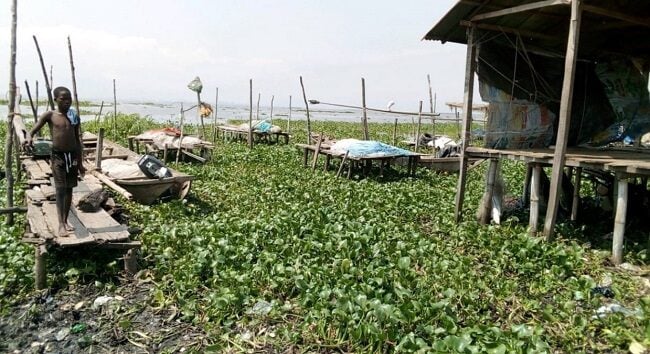In order to ensure safe and smooth navigation on inland waterways across the country, the National Inland Waterways Authority (NIWA) will begin clearance of water hyacinth on the waterways across the litoral States in the country.
LEADERSHIP reports that water hyacinth, a fast-spreading aquatic weed native to the Amazon Basin in South America, found its way into Nigerian waters through ballast water discharged from ships since the 1980s; now it reappears seasonally between July and December choking waterways, obstructing boats, and impacting fisheries and local livelihoods.
However, speaking at the flag-off of the clearance of the Lagos Inland Waterways at the Ipakodo jetty, Ikorodu, Lagos, the Area Manager, Lagos of NIWA, Engr Sarat Braimah, said the clearance campaign would extend to Bayelsa, Niger, Delta, and other NIWA area offices as the agency tracks the weed’s movement through river currents.
According to Engr. Braimah, the authority is starting the weed clearance from the Ipakodo jetty in Ikorodu, where operations are ongoing to tackle the widespread aquatic invasion that has disrupted transport and navigation.
“We are monitoring the flow — as the weed moves, our teams move with it,” Braimah explained.
Engr Braimah explained that the clearance exercise is a critical safety intervention rather than a routine clean-up.
“This effort is not just for beautification; it’s about safety. If we allow boats to navigate through this invasive weed, their engines will be damaged, and water users will face serious risks,” the NIWA Lagos Area boss said.
She explained that NIWA’s operations are part of a federal government intervention aimed at ensuring safe navigation and sustaining inland water transport. “It’s a way of giving back to boat operators and commuters who depend on these waterways daily,” she said.
The Lagos Area Office further disclosed that the Authority deployed heavy-duty machinery, including a “Swamp Devil,” which cuts through dense vegetation to clear navigation channels and restore safe passage for ferries and cargo boats.
Ahe also hinted at ongoing research and collaboration to turn the challenge into an opportunity. She recalled a training programme in Wisconsin, USA, where water hyacinth was found to have economic potential — usable for bags, furniture, and herbal products.
“Research is ongoing to establish a centre that will help us convert this menace into useful products,” she said, adding that NIWA and the Lagos State Waterways Authority (LASWA) are collaborating to ensure comprehensive clearance efforts.
Despite the recurring nature of the weed, Braimah assured that NIWA’s proactive response this year will minimise disruptions.
“We may not completely eradicate it, but we are determined to tackle it each time it appears,” she affirmed.





